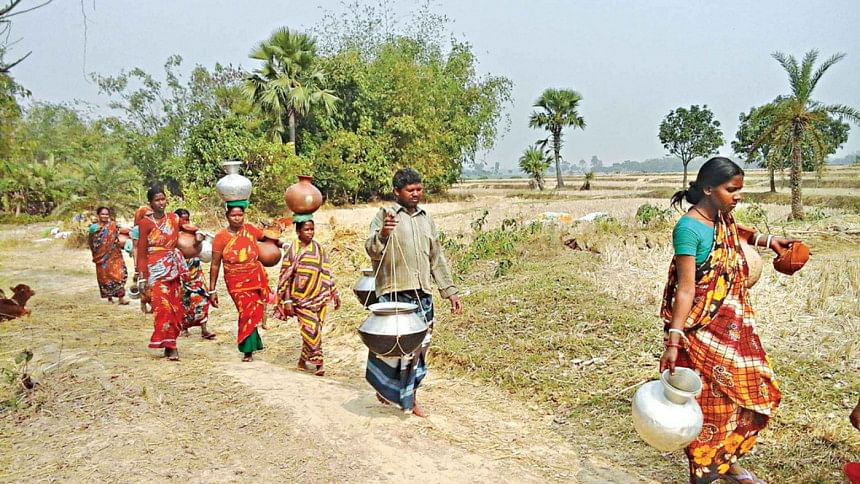Acute water crisis in Barind region

According to a report in this daily yesterday, people in the Barind region of the country are facing an acute shortages of water, including drinking water, due to depleting groundwater levels. Many paddy farmers spoke to The Daily Star of being forced to diversify to less water-intensive crops or converting their croplands into ponds and brick kilns, in a region where this essential resource is becomingly increasingly dear.
Experts say this is a result of the abuse of existing groundwater levels, which are mostly being extracted for paddy farming, rice mill operations and other industrial purposes, leaving the locals including small paddy farmers high and dry. The picture painted in the report is disconcerting, with farmers expressing their anger over having to pay high prices of water for their crops from private deep tube-wells, while the canal they have been installed next to—meant for supplying water from the Padma to nearby agricultural fields—runs dry. Data from the Barind Multipurpose Development Authority suggests that around 70 percent of the region's annual groundwater extraction of 13,710 million cubic metres is done by unregulated private deep tube-wells—enough to fill up around 18 lakh ponds that are each two metres deep and cover one bigha.
However, the abuse of groundwater for farming and industrial purposes is an issue that affects not just the Barind region, but the entire country. Bangladesh is the world's fourth largest rice-producing country, and groundwater provides 75 percent of the water needed for rice irrigation. An estimated 3,000 litres of water are required to produce just one kilogram of Boro rice, and this estimate doesn't even count the water being used up in the rice mills. It is thus abundantly clear that unless steps are taken urgently, thousands of farmers and rural communities across the country will suffer deeply from the lack of adequate levels of groundwater.
The right to water of every citizen of this country is set out in the Bangladesh Water Act 2013 and Bangladesh Water Rules 2018, and the government should ensure that these laws are enforced and water resources are secured and regulated effectively. In this regard, the Water Resources Planning Organisation (WARPO) has taken up ambitious plans to map surface and underground water resources across the country, in order to identify safe withdrawal limits of groundwater and regulate water use. This water governance project is a step in the right direction, and the government must ensure that it is implemented efficiently and transparently. At the same time, it must also take steps against industries that are abusing shared water resources, and encourage farmers to move towards less water-intensive crops in regions where groundwater requires preserving.

 For all latest news, follow The Daily Star's Google News channel.
For all latest news, follow The Daily Star's Google News channel. 



Comments